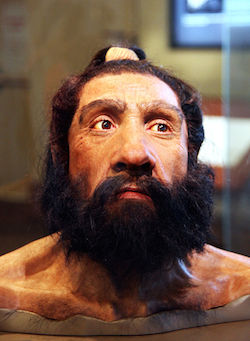 Evolution
Evolution
 Human Origins
Human Origins
A Deep and Abiding Need for Neanderthals to Be Stupid. Why?
 When Neanderthal man was first classified, he satisfied a felt need for a separate, intellectually inferior human species, fleshing out (so to speak) the Ascent of Man. But there has been a significant change in his status in recent years, as researchers began separating what we see from what we think ought to be or must be true.
When Neanderthal man was first classified, he satisfied a felt need for a separate, intellectually inferior human species, fleshing out (so to speak) the Ascent of Man. But there has been a significant change in his status in recent years, as researchers began separating what we see from what we think ought to be or must be true.
The editors of the British newspaper The Guardian, for example, recently reappraised Neanderthals’ intelligence in the light of evidence of their use of pigments and decorative shells. (They used red ochre pigment 250,000 years ago.) Some apparently used feathers as decorations and others built houses from mammoth bones, featuring carvings and pigments.
They chipped tools for various jobs as well, to be sure (and made string), and organized their living spaces by task. Curiously, when one research group meticulously reproduced both Neanderthal and early modern human tools, according to Stone Age methods, and then used them for customary tasks of the day, they found that, contrary to sixty years of textbook orthodoxy, "early stone tool technologies developed by modern humans were no more efficient than those used by Neanderthals." Neanderthals tended to have bigger hands, which may have created the impression of comparative clumsiness. At any rate, their leather working tools were like those in use today. They also reworked their tools, perhaps to avoid wasted effort. Some argue that they learned such skills from homo sapiens (current humans), but, if so, they had to grasp the underlying concepts in order to do so.
 Neanderthals were also a seafaring people. One paleoanthropologist found their distinctive stone tools on the island of Crete in 2008. They were omnivores like ourselves, probably ate fish, and apparently used medicinal plants as well.
Neanderthals were also a seafaring people. One paleoanthropologist found their distinctive stone tools on the island of Crete in 2008. They were omnivores like ourselves, probably ate fish, and apparently used medicinal plants as well.
More significantly, Neanderthal paintings of seals have been found (an "academic bombshell"). Also, perhaps inevitably, jewelry and makeup. As one researcher puts it, "The findings show that our long-lost cousins were cognitively advanced from the get-go, long before modern humans appeared in Europe."
Did Neanderthals speak? Some say yes, and thus attempt to argue that language involves no great leap in human cognition; language is all just more Darwinian gradualism (as in half a noun or three quarters of a verb?). Others say yes for a different reason; Neanderthals were mostly right-handed and "No animals other than humans show such a bias toward right-handedness." While it is reasonable to assume that they could speak, given their other cultural activities, the "right-handedness" thesis doesn’t sound like the surest evidence.
Neanderthals are also said by some to have had "a deep-seated sense of compassion" There is some evidence that they cared for invalids. One 500,000-year-old Homo heidelbergensis fossil (a group now generally classed with Neanderthals) was of an individual too old to hunt, probably a hunchback who needed a cane for support. At about 45, he was the most elderly ancient human found at the time, and the evidence suggests that, in an unsparing environment, others must have cared for him. Less believably, some have tried to psychoanalyze Neanderthal man, claiming, for example, that he couldn’t have told a "walks-into-a-bar" joke. But how would we know?
Generally, we only know what we find that early peoples actually did; we can’t know what they might have done or been unable to do under counterfactual circumstances. But one commentator, science writer Michael Shermer, offers a defense of a standard Darwinian view:
… there is almost no evidence that Neanderthals would have ever "advanced" beyond where they were when they disappeared 30,000 years ago. Even though paleoanthropologists disagree about a great many things, there is near total agreement in the literature that Neanderthals were not on their way to becoming "us."1
Shermer repeated his views on Neanderthals last week in a debate with Stephen Meyer on the Michael Medved Show. Their tools and culture did not change, he informs us, for more than 200,000 years. That, says paleoanthropologist Richard Leakey, is "a technological stasis that seems to deny the workings of the fully human mind."2
Does it? Prehistoric and non-literate cultures in general are static compared to modern ones. There is a good reason for that. When life depends almost entirely on unpredictable natural events, static culture feels like an insurance policy: "Our ancestors always did things this way, and they survived!" Aid workers from technologically advanced societies struggle with this attitude in poor remote communities to this day. Yet no one supposes that the struggling peoples who cling to such a view do not have a "fully human mind." What they don’t have is psychological room for error.
Shermer insists that such advances as Neanderthals made were the result of contact with current humans. As for burying their dead in a fetal position, strewn with flowers, he cites authorities who suggest that graves "may have been dug simply to remove corpses from habitation areas" and that the choice of the fetal position was merely a "desire to dig the smallest possible burial trench" (and not because the mourners thought that the dead might be reborn).
The clincher, in his view, is that we have not yet found a Neanderthal site where "grave goods" (food, jewelry, etc.) were left with the departed. No, but some researchers have noted that, curiously, child burials featured "generally more elaborate graves than older individuals." This points to some sort of belief, though we may never know what it was.
One must ask, given all the things we have discovered recently about Neanderthals, what if we do find the sort of grave goods he specifies? Would that change his view? Possibly not. He feels that we, the "glorious contingency," won out over the Neanderthals, because we are smarter:
Had Neanderthals won and we lost, there is every reason to believe that they would still be living in a stone-age culture of hunting, fishing, and gathering, roaming the hinterlands of Europe in small bands of a couple of dozen individuals, surviving in a world without towns and cities, without music and art, without science and technology … a world so different from our own that it is almost inconceivable.
In fact, quite apart from the fact that Neanderthals appear to have been part of our own families, they have persistently failed to be as stupid as Shermer’s account needs. Increasing numbers of finds are breaking down the supposed differences between them and other early humans. As one paleontologist puts it, "The historical downgrading of our Neanderthal cousins has gone well beyond the scientific."
It’s not clear, however, that "the scientific" was driving the need to downgrade Neanderthal man so much as a Darwinian anthropology that is at odds with the archaeology.
Editor’s note: Here are links to the whole "Science Fictions: Human Evolution" series to date.
References Cited:
(1) Michael Shermer, quoted in Bruce L. Gordon and William A. Dembski, The Nature of Nature: Examining the Role of Naturalism in Science (Wilmington, DE: ISI Books, 2011), p. 452.
(2) Ibid.
